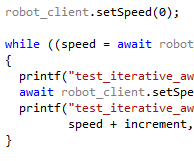Both keynotes from Meeting C++ 2015 are now online!
See Chandler Carruth and Lars Knoll giving the keynotes at Meeting C++ this year:
Both Keynotes from Meeting C++ 2015 are online!
by Jens Weller
From the article:
Great news: Since yesterday, both of the keynotes from this years Meeting C++ conference are on youtube! Both keynote speakers chose to speak on a specific topic, and delivered very well. There is also a playlist for Meeting C++ 2015.


 This article is considers lots of approaches to solving a concurrency problem, but of particular interest are the sections showing the power of the Concurrency TS
This article is considers lots of approaches to solving a concurrency problem, but of particular interest are the sections showing the power of the Concurrency TS